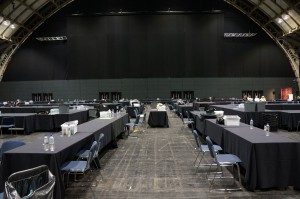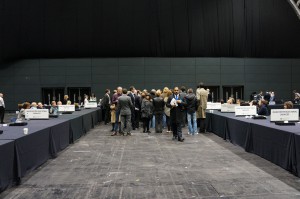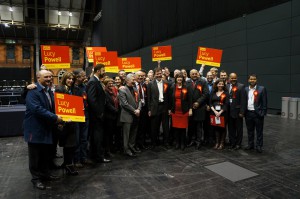Electorate shrugs as vast majority of voters ignore ballot
Article published: Friday, November 16th 2012
Pitiful turnout cast doubt on the legitimacy of police and crime commissioners on a night where new candidate Lucy Powell easily held the Manchester Central byelection for Labour in place of the outgoing Tony Lloyd.

The hall after counting had ended. Turnout in last night’s election was the lowest recorded since World War Two
An uninspiring night saw a Greater Manchester turnout of 13.5 per cent in response to the first elected overseers of the UK’s regional police forces. The numbers who could be bothered to vote varied from a poor 18.3 per cent in Trafford to a dreadful 11.4 per cent in Wigan.
The poor results cast a shadow over the legitimacy of the new post even before the counting of votes begins later today, with ex-Manchester Central Labour MP Tony Lloyd tipped as the likely winner.
Finger pointing began early on in the night, as Tory activists accused Lib Dems in government of purposely delaying the PCC elections until November to avoid a double drubbing in the May local election polls. Several Lib Dem activists returned the favour later on by cheerfully celebrating the news that the Tory candidate in the Manchester Central byelection lost his deposit.
Lucy Powell hailed her victory, which saw her returned as Manchester’s first woman Labour MP with slightly under 70 per cent of the vote, as a “clear rejection of what this government has been doing to the people of Manchester”.
A senior ally to Ed Miliband and manager of the Labour leader’s successful party leadership campaign, Powell claimed that her priorities would be to campaign for a living wage. “The cost of working is too high for people here in Manchester”, she said. She also argued the result reflected “real support for Labour, I think people feel that Labour is speaking for them and stands up for the ordinary hard-working majority.”
The byelection turnout suggested little electoral support for anyone. A mere 18.5 per cent of the electorate voted for any candidate, an almost unprecedented low in peacetime Britain since universal suffrage was won. The total number of Labour voters in a shrunken pool of voters halved from 21,059 in 2010 to 11,507, although the utter collapse of the other parties ensured that Labour’s majority remained steady at just under 10,000.
Former Manchester Liberal Democrat leader Marc Ramsbottom, a longstanding councillor for the city centre ward before proving a casualty of his party’s catastrophic local election showing last May, was the only one to keep his deposit. But the number of voters willing to turn out for the junior Coalition party plummeted to a mere 1,571, compared to 10,620 in the 2010 general election.

The Conservatives walked away with less than 5 per cent of the vote, losing their deposit in the process
The Conservatives fared far worse, winning a terrible 754 votes compared to 4,704 in 2010 and narrowly avoiding humiliation by placing just five votes ahead of UKIP’s 749.
On the far right the foundering British National Party’s vote dwindled from 1,636 in 2010 to a hard core of 492.
The parties of the left failed to capitalise on any widespread dissatisfaction, with Greens securing only 652 votes and the Pirates 308, with TUSC and Respect both gaining fewer votes than the number of spoiled ballots.
Powell conceded that “nobody likes a low turnout” but insisted she had less to worry about than her rivals. “It’s not the Labour vote that stayed at home tonight it’s the other parties, and I’m sorry there’s nothing I can really do about that.”
Richard Goulding
More: Manchester, News
Comments
No comments found
The comments are closed.




